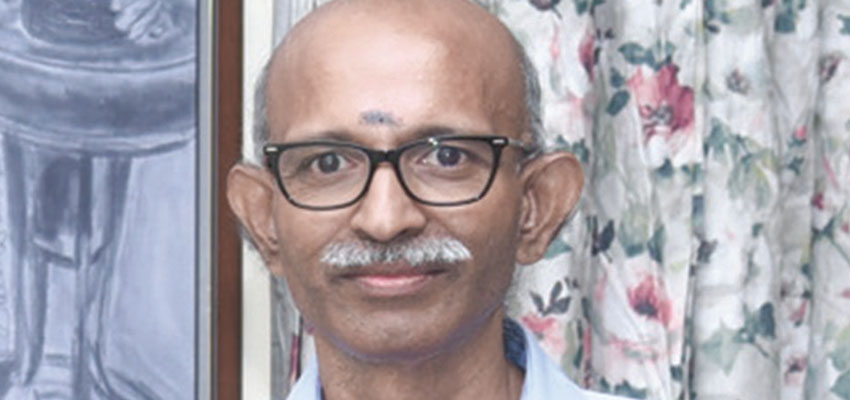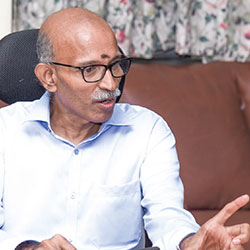CFO's Journey of Determination Transformation

Embrace the fusion of desire and divine intervention as we embark on an awe-inspiring journey with Sambasivan Ganesan, Chief Financial Officer (CFO), Tata Play, who reveals how his philosophy of discipline, dedication, and determination paved the path to his success. Corporate Citizen brings you his talk, wherein he gives instances of his corporate and personal journey and how it has helped him shape his life
Life is a fascinating canvas, painted with the colours of discipline, dedication, determination, desire, and divine intervention. For Sambasivan Ganesan, CFO, Tata Play, these elements have been the guiding forces shaping his corporate journey and personal life. His narrative takes us through a mesmerising tale of passion, language, entrepreneurship, and project management, showcasing how a blend of determination and divine guidance can lead to remarkable transformations. Corporate Citizen brings you his recent inspiring talk at the Sri Balaji University, Pune (SBUP) campus, to management students.
Embracing the Sanskrit Language
I was born in a place called Nagercoil and studied in Sri Ahobila Math Oriental Higher Secondary School, located in West Mambalam, Chennai. It was a very orthodox school as the primary language of instruction was Sanskrit. Later, I pursued my college education and completed my CA but continued to maintain my connection with the beautiful language, Sanskrit. The exact meaning of the word Sanskrit is Samyak-Krtam-iti-Samskrtam which means Sanskrit is a well-made language. If you go back to the root of coding, you’ll find Sanskrit is a language which is most amenable to coding. Having learned a little bit of Python, I can see a lot of parallels as to how Sanskrit can be used in coding. However, in case you are interested in learning any new language and have this ambition to learn say, French, German or Korean—instead of learning any other language which is foreign to us, possibly you can think of learning Sanskrit. I personally feel that all Indians should have some knowledge of Sanskrit. It's important for us to keep the culture intact.
Entrepreneurial Speed of Decision Making
While working in Reynolds Pens company in the year 1996, we had 60 per cent national market share in the ball pen industry. Reynolds Ball Pen used to be a giant brand leader. I spent about three years there. The company was making more than 100% profit, because there was no comparison to that quality offered. The brand ambassador for Reynolds in 1996–98 was Sachin Tendulkar. When I joined the company I was given the responsibility of manufacturing operations at Puducherry. The corporate office was in Chennai and the manufacturing location was in Puducherry.
At that time Reynolds 045 ball pen was the flagship product of this company. I was given the target of manufacturing one million ball pens per day, and 400 million ball pens per annum. I used to receive calls from the sales director every morning at 9am from Chennai, about stock availability. For the first six months since I joined the company, the demand always remained more than the supply. Therefore, I immediately started working on increasing the production capacity. We needed to build some additional plant so it took us a month to find a place. It would take about twelve months to build a factory, get all the approvals and start production.
"If you are determined, another essential quality you need to possess is the ability to influence your team. Influencing the team and convincing them to believe in something they don’t believe in is not an easy task"
During that period, when there were no tools like e-mail available, I worked for a month with all the team members through fax. At that time, we did a lot of work and prepared 6-7 pages’ plan, noting points like the things we have looked at, this is how we can expand the capacity, this is a place we have to buy, this is how it will work, and it will cost us so much money. There was requirement of around six crores of investment.

There used to be a production planning meeting in Chennai and every week from Puducherry to Chennai, I used to go and attend that meeting with the managing director. I thought, the MD will be calling me for the production planning meeting and ask us to make detailed presentation. So I sent a fax of all my work. Surprisingly, within 15 minutes, a fax comes back with the last page of the fax saying, “Okay, it is approved.” I was shocked because I expected the MD would have discussion with me over the plan. He did not say anything, he just said, “Okay, approved”. That's what I call the spirit of entrepreneurship—I learned something big that day— “entrepreneurs don't waste time”. That was the speed of decision making, because he trusted my judgment completely.
Over one year down the line we inaugurated the new factory. It is a perfect example of what is the thought process of an entrepreneur. My MD was the founder of the company called GM Pens International, his name was Mohammed Meeran. The letter “G” stood for one person called Gomathinayagam Natarajan and “M” stood for Mohamed Meeran. And these two people were the co-founders of the company. The speed at which they think and they decide like “Business @ the Speed of Thought”, a book written by Bill Gates. Reading this book was a big learning for me. It taught me that when you are having a conversation with somebody, don't waste time for decision making. If the person has done complete study, there's no need to have a conversation again.
"Sometimes in the quest for perfection, we tend to miss the bus. There should always be a balance between quest for perfection and quest for completion"
— Sambasivan Ganesan
Project Tiger - The Transformation Challenge
My another experience was in Vodafone, when I was the CEO of Vodafone Kerala Circle. At that time, Vodafone took over Hutchison and I got the opportunity to come back to finance as a CFO in Mumbai circle—when I joined there, Vodafone wanted to restructure the entire finance function. Because, technologically Hutchison was using Oracle as the accounting system and Vodafone was using SAP. Thus, transitioning to SAP became imperative. Clearly, converting all Oracle enthusiasts to SAP was the logical step. With an impending company takeover, maintaining a unified system was essential—having Oracle in one country and SAP in others would not align with their vision. So we were given a project of transformation of the entire organisation from Oracle to SAP.

We had to change all the processes and transform it to Vodafone processes. Then there was the technology that had to be changed from Oracle to SAP. Another thing was that we needed to move all the back office accounting operation to single place. The concept of Shared Service Centre was getting into picture. In those days, Vodafone had its Global Shared Service Center, in Budapest, and they envisioned creating a parallel hub for India. So I was chosen to lead this endeavour as the Program Director. It was a new thing for me. I was in my comfort zone as CFO, and till then I had never managed any large project in my life. So I had to learn what project management was.
I had not done anything related to project management, but somehow they entrusted me with that responsibility. They must have believed that I could handle this transformation work, so I became the director of Project Transformation. It was a two-year project and they named it as "Project Tiger". The initial step we had to take was to build a team. I was reporting to my CFO, Andrew Davies. He told me that I have complete freedom to select my own team, which was a great opportunity. At that time, we needed to choose maximum 40 people, within my entire finance organisation across the country. I had an option of choosing the best people. The project was tough, and everyone was putting in about 18 hours of work every day.
We were planning to go live, starting with Gujarat as the first circle. So after 24 months of project work, the day before the go-live date I was having a meeting in that shared service centre, sitting and saying, okay, what are the things to be done tomorrow morning? Many people started explaining me the reasons why we couldn't go-live tomorrow. Faced with this situation, I had to make a decision. Should we proceed with the go-live as planned or cancel it? It was a big dilemma. Eventually, I opted not to change the date. The following morning, we prepared to go-live, considering what our best course of action could be. We decided to remain in the office, giving it our all, while sticking to the original go-live date. I had to make that call at that moment.
The lesson I learned from this incident was about Determination—I was determined to go-live. Yes, we had problems during the initial 30 days, including hyper care problems and other challenges. However, we persisted in resolving these issues, though it took time. Because after a few months, there was an annual global conference to happen, which would have representatives of Vodafone from around 28 countries, including all the CFOs. Surprisingly, they selected our Project Tiger as the most successful project, and it went on to win an award that year. I am pretty sure that if I had not made the decision to go-live on that day, we would not have been thought about for any award or anything like that.
The Ability to Influence your Team
If you are determined, another essential quality you need to possess is the ability to influence your team. Influencing the team and convincing them to believe in something they don’t believe in is not an easy task. Doubts are natural in any significant project, and you cannot be 100 per cent sure about anything.
Quest for Perfection and Completion
Sometimes in the quest for perfection, we tend to miss the bus. There should always be a balance between quest for perfection and quest for completion. In quest for completion within time, there are no right or wrong rules. But, I generally see quest for completion within time, as more important than quest for perfection. That doesn't mean that I do a shoddy job. We ensure that our work meets a certain minimum or exceeds minimum quality standards.
However, in large projects, losing momentum can make it incredibly challenging to start over from scratch. Starting over and setting a new deadline could add another 30-60 days to the timeline. Once momentum is lost and delays occur, it establishes a precedent that the project can be delayed. Missing a deadline can make it challenging to restart. Conversely, consistently meeting deadlines brings a unique sense of satisfaction.